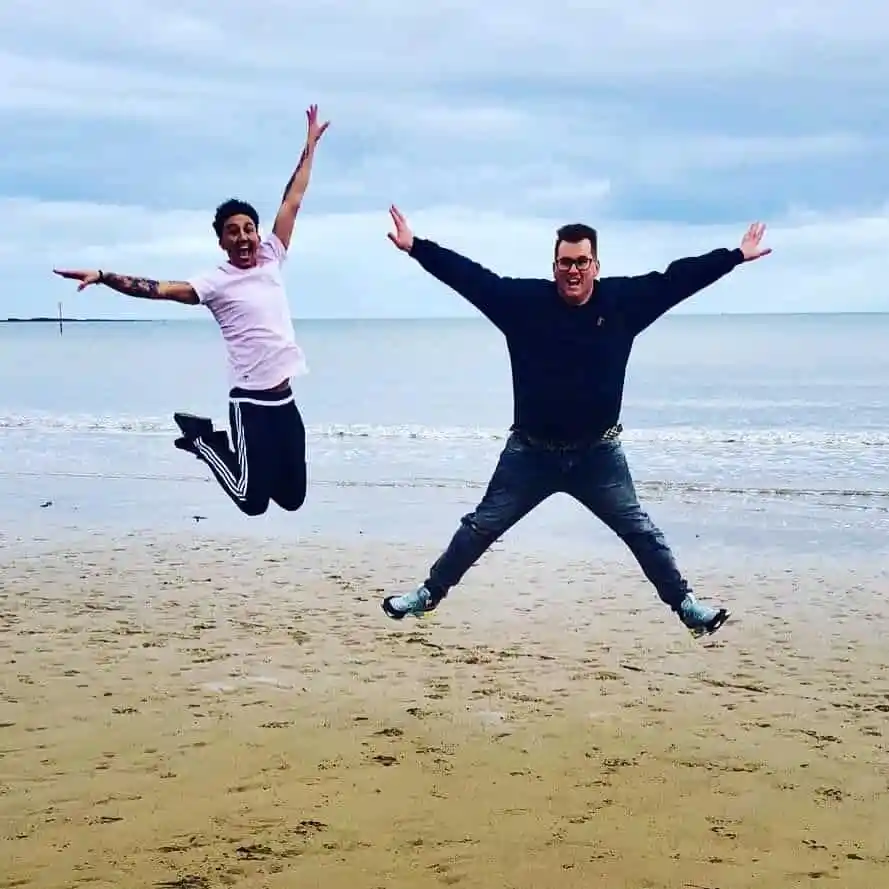[ad_1]
Paul (L) and Michael (R) with their four sons. (Supplied)
When Michael and Paul Atwal-Brice met their adopted twins Levi and Lucas for the first time, the connection was instant.
The Yorkshire-based couple were set on adoption, so when social workers told them the Levi and Lucas were experiencing developmental delay, they didn’t think too much of it.
“We just thought that because they were premature they were a bit delayed and they’d catch up in time,” Michael tells PinkNews.
Before long, it became clear that the boys were experiencing more than just developmental delay.
Levi didn’t start walking until he was almost three years old. Both boys were non-verbal and struggled with eye-contact.
When Levi and Lucas were three years old, a team of experts diagnosed them with severe autism. Shortly afterwards, both were diagnosed with epilepsy.
Today, Levi and Lucas are 16 years old – and they’re thriving. It hasn’t always been an easy journey for Michael and Paul, but they’re proud they’ve been able to create a loving family while overcoming adversity and ableism along the way.
“Over the years we’ve developed a really strong bond with the boys. We get that eye contact and we get smiles a lot,” Michael says.
Paul is a former professional dancer, and he’s used his training to help Levi and Lucas express themselves.
“Levi loves to dance,” Paul laughs. “He’s 16 years old now and he still wants me to pick him up and spin him around.”
Both Levi and Lucas are non-verbal, but they have such a strong bond with their dads that they have their own ways of communicating.
“In a way we can understand – they’re still able to tell us what they want because that’s how we’ve become with them,” he says.
Sadly, dealing with the boys’ epilepsy has been more challenging.
Levi and Lucas started having fits shortly after they were diagnosed with autism, and that led to both boys being diagnosed with severe, complex epilepsy. They’re both in the life threatening epilepsy category, and Levi was once in a paediatric intensive care unit.
“I just hope we never go through anything like that ever again. That was the darkest time of our life,” Paul says.
Gay dads want to ‘normalise’ disability
It was that experience, and their journey to getting Levi and Lucas diagnosed with autism, that inspired Michael and Paul to start their own podcast. They’re the proud hosts of Diffability, which is released through the Dadsnet network.

“Us being so open has been our therapy,” Paul explains.
“There is nothing worse than a parent who is struggling with a child’s behaviour or health and thinking they’re on their own. The more we talk about this, the more we can normalise it.
“We like to point families to the right charities and the right supports because when Levi and Lucas got their diagnoses, we felt really isolated. It was like it was just us, and we ended up being reclusive because people were staring at the boys.”
‘Where’s their mum today, has she got a day off?’
It’s been a long journey for the family. The cruelty of strangers made the loneliness and isolation Michael and Paul felt in those early years even worse.
“People often just judge things on face value, so if we were out with Levi and Lucas and they were behaving in a different way – making loud, sudden noises – people in the public domain would pass comment. That really affected us and it still does to so many parents out there.
“By talking about disabilities and complex health needs, you’re educating people about it. So if we’re out with the boys, don’t stare – just come up and talk to us.
“They’re only children. They only have one childhood and we are doing everything we can to advocate for them.”
Michael and Paul have had to overcome countless barriers to be the best dads they can possibly be – including homophobia.
“People would often ask: ‘oh, where’s their mum today, has she got a day off?’ Those comments do affect you,” Paul says.
Despite the challenges, Michael and Paul have loved being dads so much that they later decided to adopt two more children – twin boys Lotan and Lance are now four years old.
Both Michael and Paul are quick to recommend adoption and fostering to other LGBTQ+ people – their advice is to be “completely open and honest” with social workers from the start. If you’ve been through hardship in life, that can make you a better parent – and social workers will recognise that.
‘There is no perfect family out there’
“When we were children we faced difficult times with domestic violence and drinking and fighting,” Michael says.
“You think that could go against you, but actually it shows the adoption team that you’ve been through difficult times and you’ve come out the other end stronger, so that gives you the strength to be a parent.”
Paul points out that there’s no such thing as perfect parents – all you can do is be the best version of yourself for your kids, and that’s all they really need.
“There is no perfect family out there, there is no perfect relationship, there is no perfect individual.
“We all face difficulties in different stages of our life – it’s about how you deal with it and how you overcome it.”
You can listen to the Diffability podcast here.
[ad_2]
Source link
